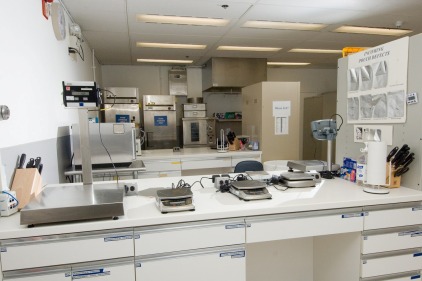Food Research Facility Planned for UC Davis
UC Davis officials are forging a plan to turn the campus into a nexus for food research, policy and new technology.

Only a month old, the plan calls for the creation of a World Food Center that would tie together the more than 30 centers or institutes on the UC Davis campus that engage in research related to food, nutrition and health, Katehi said.
The chancellor said she hopes the center will come to be seen as the Brookings Institute for food, producing leading research on everything from food policy to genomics.
"We envision working with other universities and research centers across the U.S. and worldwide," Katehi said. "We believe we will achieve technical and commercial breakthroughs in food science and the ability to examine food as a comprehensive system."
Katehi extolled the virtues of the plan to the Board of Regents at their San Francisco meeting with the help of Karen Ross, secretary of the California Department of Food and Agriculture. The food center would initially report to the UC Davis chancellor and will be funded through private and corporate donations, Katehi said.
Consultations with faculty and other experts resulted in the conclusion that a $100 million endowment would be needed to establish the center and keep it operational for three years.
Katehi said the university has spoken to individual, corporations and nonprofits, as well as state and federal agencies, about involvement in the center.
"We're building a network of support, but I cannot say anything more directly at this time," she said.
She said she believes the center should strive to bring together teams of experts from around the world to develop solutions to the challenges of feeding a hungry planet.
A United Nations food security study last year found that 850 million people are undernourished worldwide. The study also said that most of the significant progress in reducing hunger was achieved prior to 2008.
Ross lauded the timing for the creation of a food center at Davis, given the powerhouse status of agriculture in the state.
"This is about economic development," Ross said. "During the recent economic turmoil, agriculture in California continued to grow. We went from $38.5 billion in 2010 to $43.5 billion at the farm gate in 2012. That's a big accomplishment and driven by factors that make the timing of the food center especially right."
The vision is for the center's team members or partners to come together and openly share intellectual property – "but they will monetize it as a team," Ross said.
It did not take long for interest in the center to percolate from a representative of the food industry. Frederick Ruiz, founder of the privately held Ruiz Foods Inc., sits on the Board of Regents. He weighed in on the matter during Katehi's presentation.
"Our company is a food processor and we've identified UC Davis as the school that we would like to work with on research, new products, on process engineering, and food safety," Ruiz said. "It (the center) is a one-stop shop from a food process perspective."
Katehi said the university may consider evolving the center into a nonprofit to optimize its potential.
"We may discover that the center has all the autonomy and flexibility it needs as a campus entity," Katehi said. "This is something that we will look at later after the center has received more definition about the partnerships it will pursue."
Looking for a reprint of this article?
From high-res PDFs to custom plaques, order your copy today!





